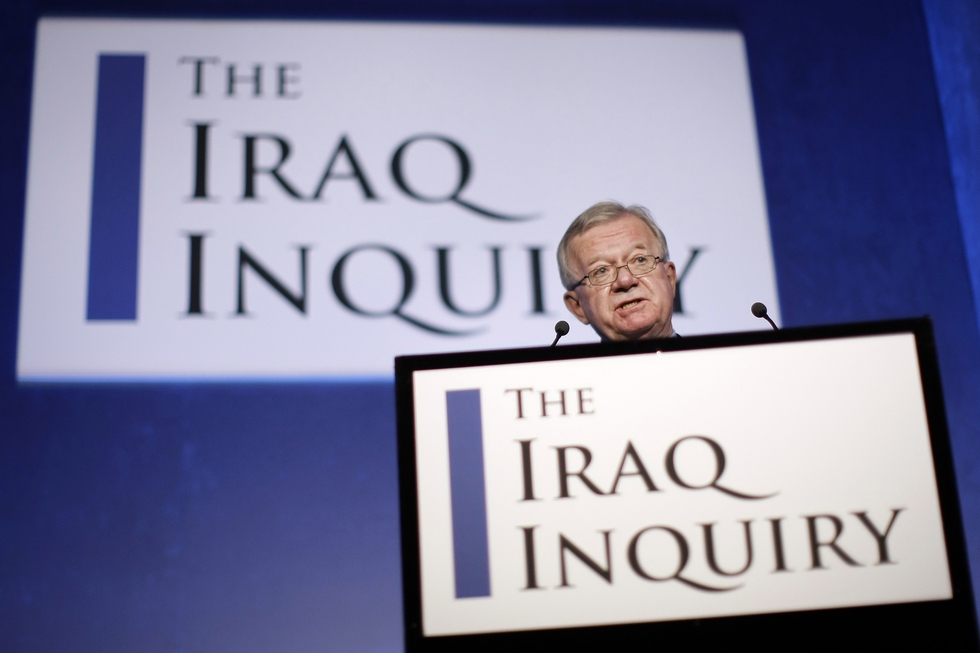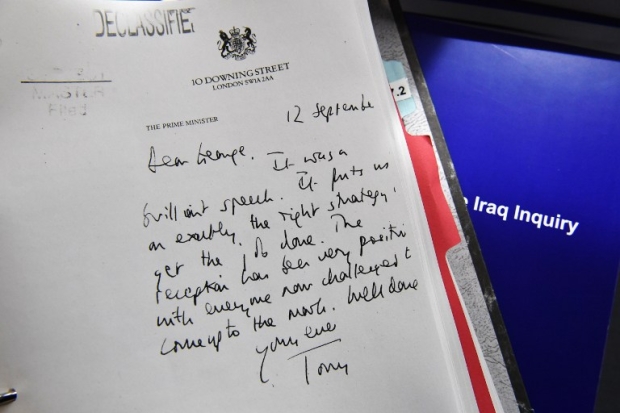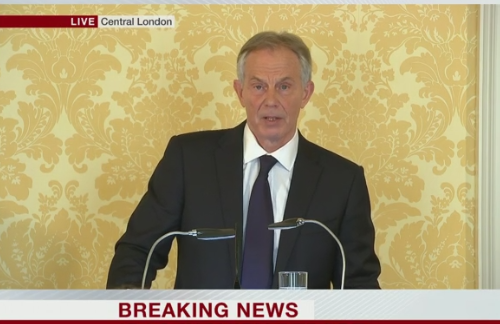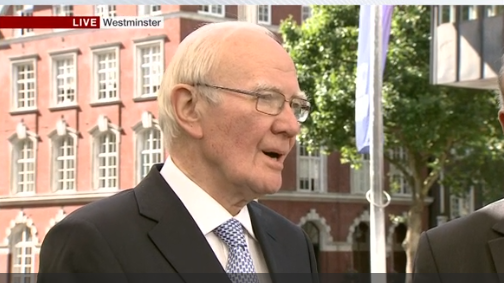LIVE BLOG: Chilcot as it happens

The long-awaited report by Sir John Chilcot, probing why Britain went to war in Iraq and what lessons can be learned, was released on Wednesday.
The report has taken seven years to complete and has cost £10m.
Live Updates
MEE reporter Jamie Merrill, who has been at the unveiling of the Chilcot report, gives his early analysis of the findings:
"This is by far the most devastating verdict on a British government since the end of the Second World War, essentially concluding that Blair needlessly rushed the country to war on the basis of flawed and exaggerated evidence and that his failure to plan for the aftermath cost British and Iraqi lives.
"Blair takes a savaging throughout the report, something the families who came to witness Sir John’s statement obviously appreciated. They applauded Sir John when he concluded his statement."
"The 150-odd international journalists gathered for the release have been shocked by the level of criticism Blair and the his government faced. Many seem to have expected the report to shy from such strident criticism of a man many see as Britain's most successful post-war prime minister."
More from Jamie Merrill, on the intelligence failings leading up to the war.
The Chilcot report says:
“The statements prepared for, and used by, the UK government in public from late 2001 onwards conveyed more certainty that the JIC (Joint Intelligence Committee) assessments about Iraq’s proscribed activities and the potential threat they posed”.
Chilcot found that the JIC did not make clear to Blair that intelligence had not proved “beyond reasonable doubt” that Saddam Hussein had continued to produce chemical or biological weapons or that efforts to develop nuclear weapons continued.
“At no stage was the hypothesis that Iraq might no longer have chemical, biological or nuclear weapons or programs identified and examined by either the JIC or the policy community.”
Chilcot report also touched on the British relationship with the United States.
“The issue of influencing the US, both at the strategic and at the operational level, was a constant preoccupation at all levels of the UK government," Chilcot told reporters.
“The UK’s relationship with the US was a determining factor in the government's decisions over Iraq.”
There was a firm belief that the “best way to influence US policy towards the direction preferred by the UK was to commit full and unqualified support, and seek to persuade from the inside.”
Iraqi refugee Kais Al-Dabbagh told MEE's Charles B. Anthony that he had been "waiting nearly 13 years for an apology".
"It is a relief to see the leader of the Labour party to apologise and I'm really appreciative of Mr Corbyn of this" said Dabbagh who had lost two cousins during the Iraq war.
MEE's Charles B. Anthony is live at the Labour Press Conference where Jeremy Corbyn is making a statement in reaction to the Iraq Inquiry. Click here to listen live.
Among the thousands of pages published today, one memo has attracted particular attention.
Sent from Tony Blair to George Bush in July 2002, 'Note on Iraq' starts with 'I will be with you, whatever' and ends with 'But the crucial issue is not when, but how'.
Read a breakdown of the rest of the memo here.
Labour leader Jeremy Corbyn who has long been an opponent of the Iraq war apologises on behalf of the Labour Party for taking Britain to war in Iraq.

(Source @CharlesBAnthony)
“I can never agree that those who died or were injured made their sacrifice in vain. They fought in the defining global security struggle of the 21st century against the terrorism and violence… Their sacrifice should always be remembered with thanksgiving and honour….as it will be.
"I know some of the families cannot and don’t accept this is so. I know there are those who can never forget or forgive me for taking this decision and think I took it dishonestly. As the report makes clear, there were no lies. Parliament and the cabinet were not misled. There was no secret commitment to war. Intelligence was not falsified and the decision was made in good faith. However I accept that the report makes serious criticisms of the way decisions were made and, again, I accept full responsibility for this criticism even if I do not fully agree with them.
"Today…look at the history of that time so that those who passionately disagree will me, at least understand why I did what I did and learn lessons so that we can do better in the future."
Labour leader Jeremy Corbyn who opposed the Iraq war in 2003 will be making a brief press statement later today on the Chilcot inquiry. Earlier today in parliament Corbyn described the Iraq war as an "act of military aggression".
Here's a clip from a speech he made in the run up to the Iraq war back in 2003.
Research director of UK advocacy group CAGE UK Asim Qureshi, calls on Chilcot to recognise "that Britain went to war in Iraq based on falsified information and tortured confessions."
In his comment piece for MEE Qureshi writes:
"The story of torture in relation to Iraq is important and complicated, as it not only justified the war, but permitted an environment where torture was normalised. The DNA of the Iraq war was constructed through a story of torture for which there still has been no accountability."

Read more here
Speaking to BBC News, Liberal Democrat peer Sir Ming Campbell said:
"Frankly the judgement was poor and misconceived and it has led to a vacuum in Iraq which has been filled by a civil war where 179 British soldiers have died. The consequences of which was the 250 people who died two or three days ago in Baghdad. That shows you the state we are in right now. "
MEE's Graeme Baker dissects Tony Blair's statement posted earlier today:
Middle East Eye analyses Blair's prepared statement on the Chilcot report.
Responding to the publication of the Chilcot Report, Blair said:
“The report should lay to rest allegations of bad faith, lies or deceit. Whether people agree or disagree with my decision to take military action against Saddam Hussein; I took it in good faith and in what I believed to be the best interests of the country.
I note that the report finds clearly:
- That there was no falsification or improper use of Intelligence (para 876 vol 4)
MEE: Para 876 or volume 4 says this: "In April 2005, the ISG published additional material as Addendums to the Comprehensive Report."
A note from the ISG, the Iraq Survey Group, which was tasked by the UN to find Saddam Hussein's WMD, had found in "a very limited number of cases... old chemical munitions produced before 1990". But the note goes on to say that many reports of chemical weapons in Iraq turned out to be "scams" and while it was still possible that weapons could be found, it "would judge very unlikely, that such a capability remains undiscovered". In addition to navigating the 2.6-million word Chilcot report, a casual observer would then be required to read the full 84-page report by the ISG to gain proper insight to Blair's argument that Chilcot had cleared him of falsifying evidence.
Read more here for the full article.
An official statement from Tony Blair's office said:
“The report should lay to rest allegations of bad faith, lies or deceit. Whether people agree or disagree with my decision to take military action against Saddam Hussein; I took it in good faith and in what I believed to be the best interests of the country.
"The report does make real and material criticisms of preparation, planning, process and of the relationship with the United States. These are serious criticisms and they require serious answers."
Blair added that he would respond in full to the criticisms in full later this afternoon.
"I will take full responsibility for any mistakes without exception or excuse," he said.
He ended the statement by paying tribute to the armed forces and saying that the removal of Saddam Hussein was not the cause of terrorism in the world today.





